沪教牛津英语九年级英语上Module 1 Geniuses Unit 1 Wise men in history词汇语法学案
文档属性
| 名称 | 沪教牛津英语九年级英语上Module 1 Geniuses Unit 1 Wise men in history词汇语法学案 | 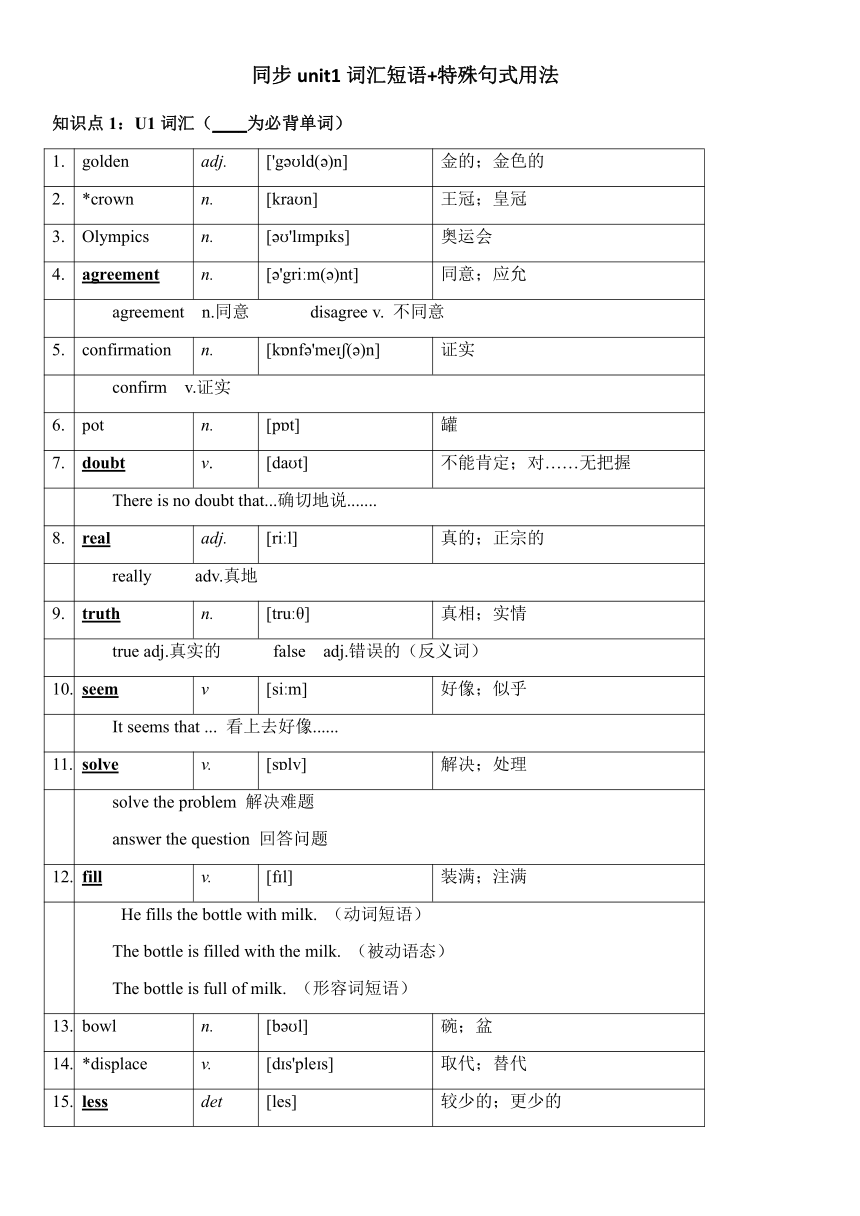 | |
| 格式 | zip | ||
| 文件大小 | 698.3KB | ||
| 资源类型 | 教案 | ||
| 版本资源 | 牛津深圳版 | ||
| 科目 | 英语 | ||
| 更新时间 | 2021-08-04 10:22:39 | ||
图片预览

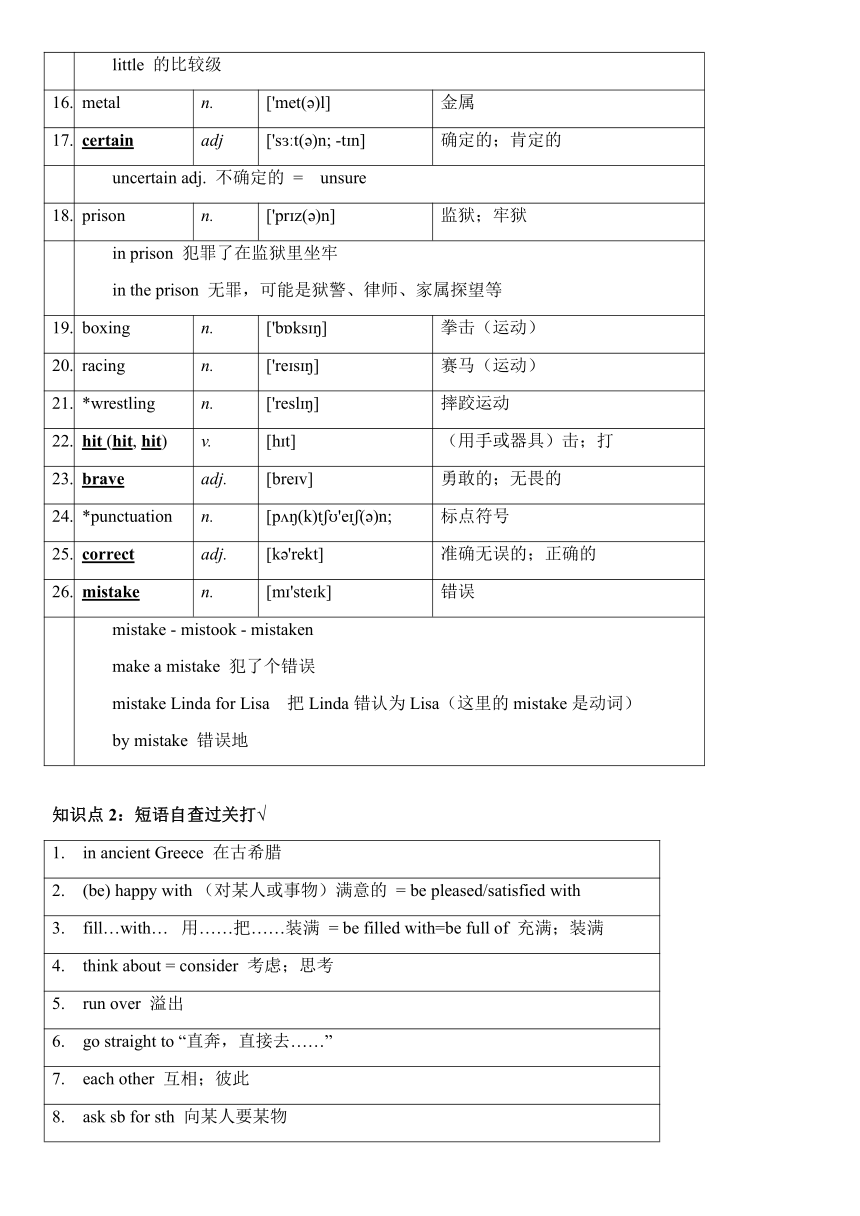
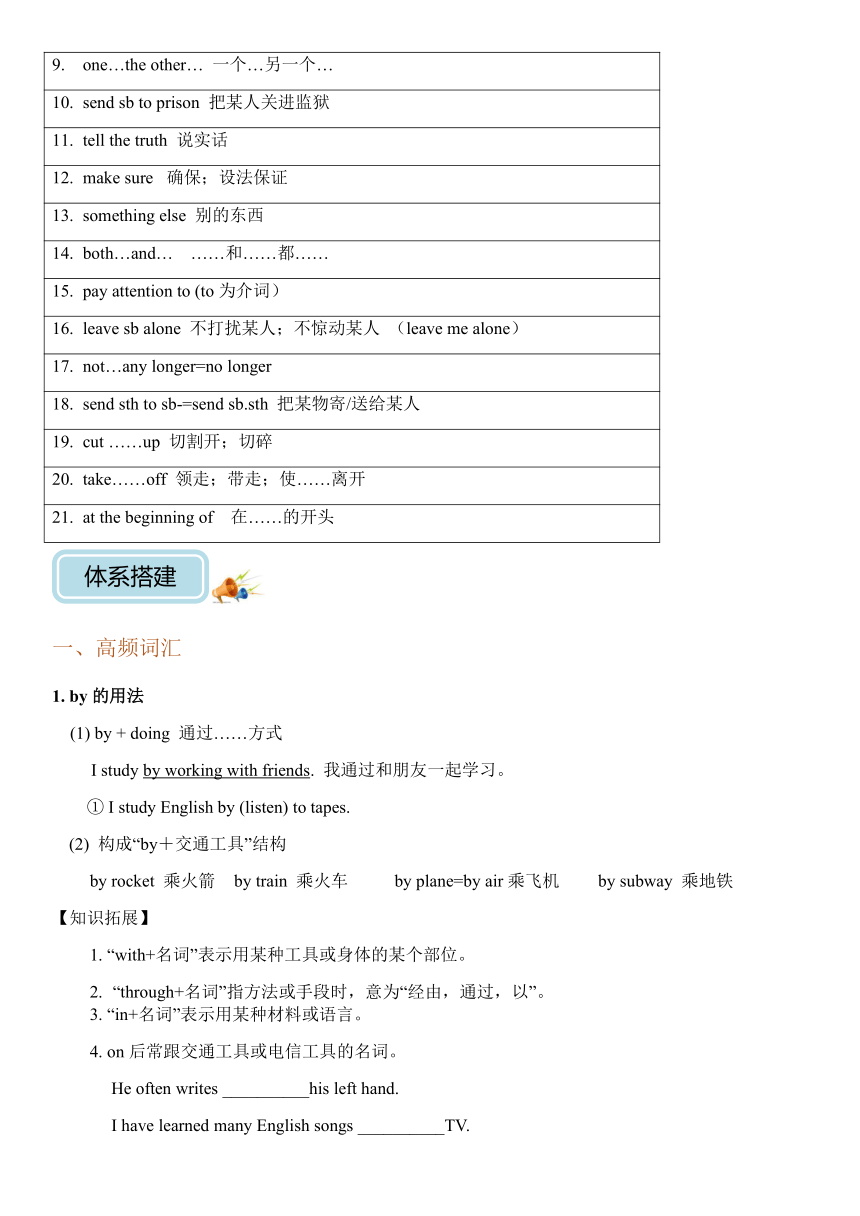
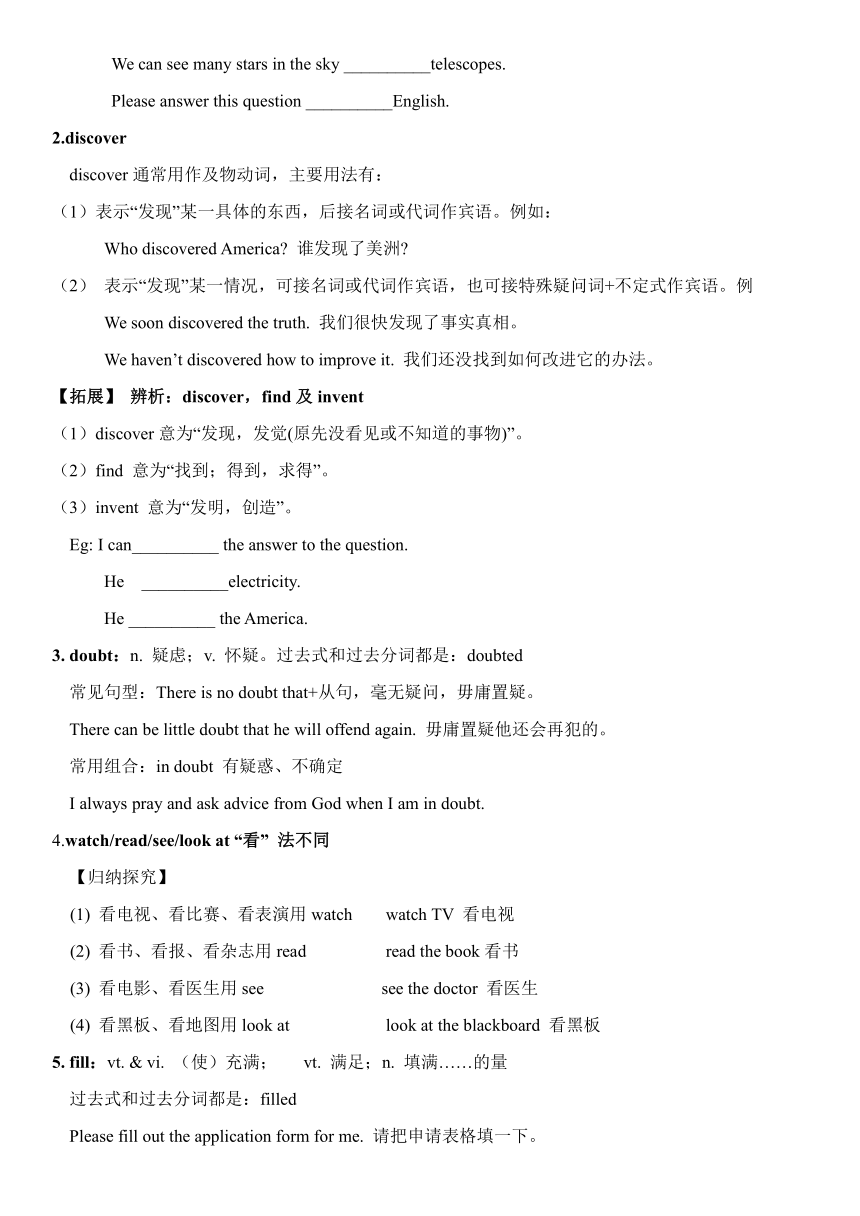
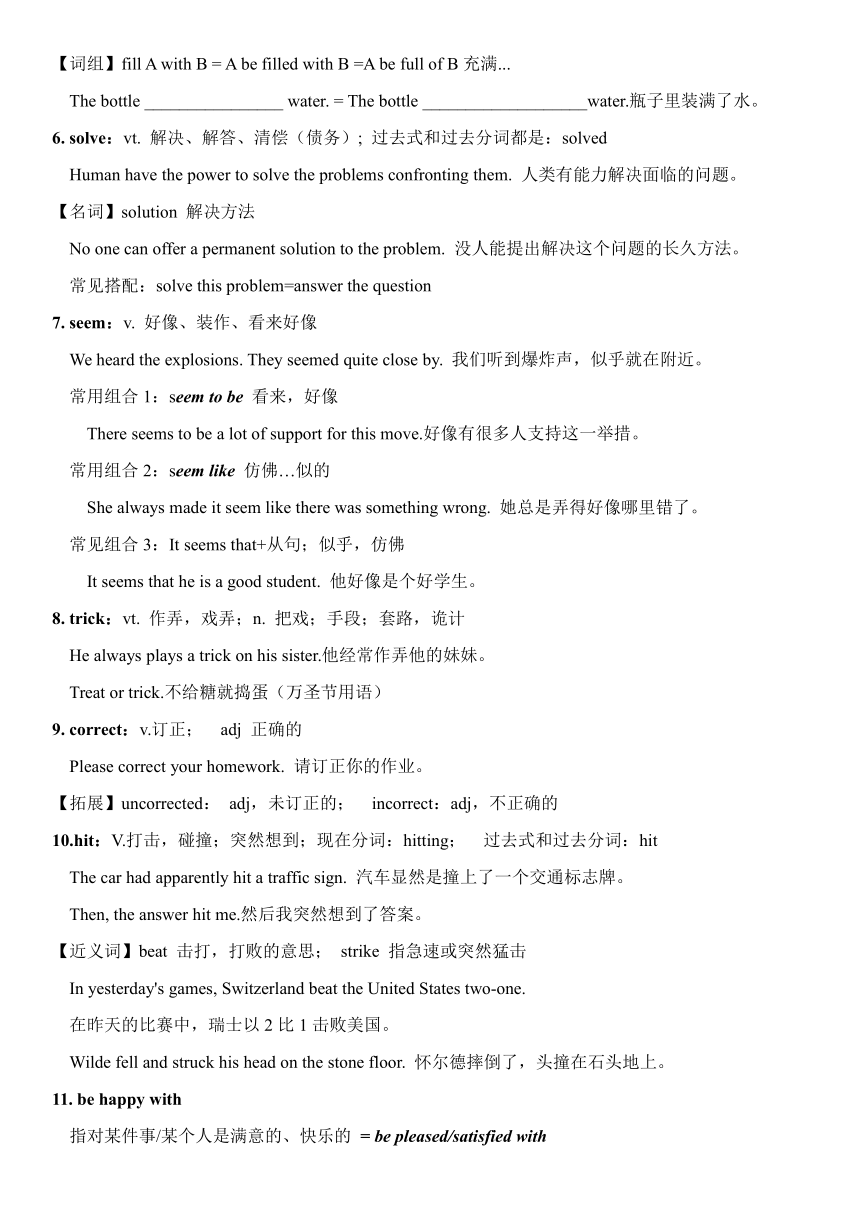
文档简介
同步unit1词汇短语+特殊句式用法
知识点1:U1词汇(____为必背单词)
golden
adj.
['g??ld(?)n]
金的;金色的
crown
n.
[kra?n]
王冠;皇冠
Olympics
n.
[??'l?mp?ks]
奥运会
agreement
n.
[?'gri?m(?)nt]
同意;应允
agreement
n.同意
disagree
v.
不同意
confirmation
n.
[k?nf?'me??(?)n]
证实
confirm
v.证实
pot
n.
[p?t]
罐
doubt
v.
[da?t]
不能肯定;对……无把握
There
is
no
doubt
that...确切地说.......
real
adj.
[ri?l]
真的;正宗的
really
adv.真地
truth
n.
[tru?θ]
真相;实情
true
adj.真实的
false
adj.错误的(反义词)
seem
v
[si?m]
好像;似乎
It
seems
that
...
看上去好像......
solve
v.
[s?lv]
解决;处理
solve
the
problem
解决难题
answer
the
question
回答问题
fill
v.
[f?l]
装满;注满
He
fills
the
bottle
with
milk.
(动词短语)
The
bottle
is
filled
with
the
milk.
(被动语态)
The
bottle
is
full
of
milk.
(形容词短语)
bowl
n.
[b??l]
碗;盆
displace
v.
[d?s'ple?s]
取代;替代
less
det
[les]
较少的;更少的
little
的比较级
metal
n.
['met(?)l]
金属
certain
adj
['s??t(?)n;
-t?n]
确定的;肯定的
uncertain
adj.
不确定的
=
unsure
prison
n.
['pr?z(?)n]
监狱;牢狱
in
prison
犯罪了在监狱里坐牢
in
the
prison
无罪,可能是狱警、律师、家属探望等
boxing
n.
['b?ks??]
拳击(运动)
racing
n.
['re?s??]
赛马(运动)
wrestling
n.
['resl??]
摔跤运动
hit
(hit,
hit)
v.
[h?t]
(用手或器具)击;打
brave
adj.
[bre?v]
勇敢的;无畏的
punctuation
n.
[p??(k)t??'e??(?)n;
标点符号
correct
adj.
[k?'rekt]
准确无误的;正确的
mistake
n.
[m?'ste?k]
错误
mistake
-
mistook
-
mistaken
make
a
mistake
犯了个错误
mistake
Linda
for
Lisa
把Linda错认为Lisa(这里的mistake是动词)
by
mistake
错误地
知识点2:短语自查过关打√
in
ancient
Greece
在古希腊
(be)
happy
with?(对某人或事物)满意的
=
be
pleased/satisfied
with
fill…with…?
用……把……装满
=
be
filled
with=be
full
of
充满;装满
think
about
=
consider
考虑;思考
run
over
溢出
go
straight
to
“直奔,直接去……”
each
other
互相;彼此
ask
sb
for
sth
向某人要某物
one…the
other…
一个…另一个…
send
sb
to
prison
把某人关进监狱
tell
the
truth
说实话
make
sure?
确保;设法保证
something
else
别的东西
both…and…
……和……都……
pay
attention
to
(to为介词)
leave
sb
alone
不打扰某人;不惊动某人
(leave
me
alone)
not…any
longer=no
longer
send
sth
to
sb-=send
sb.sth
把某物寄/送给某人
cut
……up
切割开;切碎
take……off
领走;带走;使……离开
at
the
beginning
of
在……的开头
一、高频词汇
1.
by的用法
(1)
by
+
doing
通过……方式
I
study
by
working
with
friends.
我通过和朋友一起学习。
①
I
study
English
by
(listen)
to
tapes.
(2)
构成“by+交通工具”结构
by
rocket
乘火箭
by
train
乘火车
by
plane=by
air乘飞机
by
subway
乘地铁
【知识拓展】
1.?“with+名词”表示用某种工具或身体的某个部位。
“through+名词”指方法或手段时,意为“经由,通过,以”。
3.?“in+名词”表示用某种材料或语言。
4.?on后常跟交通工具或电信工具的名词。
He
often
writes
__________his
left
hand.
I
have
learned
many
English
songs
__________TV.
We
can
see
many
stars
in
the
sky
__________telescopes.
Please
answer
this
question
__________English.
2.discover
discover通常用作及物动词,主要用法有:
(1)表示“发现”某一具体的东西,后接名词或代词作宾语。例如:
Who
discovered
America?
谁发现了美洲?
(2)
表示“发现”某一情况,可接名词或代词作宾语,也可接特殊疑问词+不定式作宾语。例
We
soon
discovered
the
truth.
我们很快发现了事实真相。
We
haven’t
discovered
how
to
improve
it.
我们还没找到如何改进它的办法。
【拓展】
辨析:discover,find及invent
(1)discover意为“发现,发觉(原先没看见或不知道的事物)”。
(2)find
意为“找到;得到,求得”。
(3)invent
意为“发明,创造”。
Eg:
I
can__________
the
answer
to
the
question.
He
__________electricity.
He
__________
the
America.
3.
doubt:n.
疑虑;v.
怀疑。过去式和过去分词都是:doubted
常见句型:There
is
no
doubt
that+从句,毫无疑问,毋庸置疑。
There
can
be
little
doubt
that
he
will
offend
again.
毋庸置疑他还会再犯的。
常用组合:in
doubt
有疑惑、不确定
I
always
pray
and
ask
advice
from
God
when
I
am
in
doubt.
4.watch/read/see/look
at
“看”
法不同
【归纳探究】
(1)
看电视、看比赛、看表演用watch
watch
TV
看电视
(2)
看书、看报、看杂志用read
read
the
book看书
(3)
看电影、看医生用see
see
the
doctor
看医生
(4)
看黑板、看地图用look
at
look
at
the
blackboard
看黑板
5.
fill:vt.
&
vi.
(使)充满;
vt.
满足;n.
填满……的量
过去式和过去分词都是:filled
Please
fill
out
the
application
form
for
me.
请把申请表格填一下。
【词组】fill
A
with
B
=
A
be
filled
with
B
=A
be
full
of
B充满...
The
bottle
________________
water.
=
The
bottle
___________________water.瓶子里装满了水。
6.
solve:vt.
解决、解答、清偿(债务);
过去式和过去分词都是:solved
Human
have
the
power
to
solve
the
problems
confronting
them.
人类有能力解决面临的问题。
【名词】solution
解决方法
No
one
can
offer
a
permanent
solution
to
the
problem.
没人能提出解决这个问题的长久方法。
常见搭配:solve
this
problem=answer
the
question
7.
seem:v.
好像、装作、看来好像
We
heard
the
explosions.
They
seemed
quite
close
by.
我们听到爆炸声,似乎就在附近。
常用组合1:seem
to
be
看来,好像
There
seems
to
be
a
lot
of
support
for
this
move.好像有很多人支持这一举措。
常用组合2:seem
like
仿佛…似的
She
always
made
it
seem
like
there
was
something
wrong.
她总是弄得好像哪里错了。
常见组合3:It
seems
that+从句;似乎,仿佛
It
seems
that
he
is
a
good
student.
他好像是个好学生。
8.
trick:vt.
作弄,戏弄;n.
把戏;手段;套路,诡计
He
always
plays
a
trick
on
his
sister.他经常作弄他的妹妹。
Treat
or
trick.不给糖就捣蛋(万圣节用语)
9.
correct:v.订正;
adj
正确的
Please
correct
your
homework.
请订正你的作业。
【拓展】uncorrected:
adj,未订正的;
incorrect:adj,不正确的
10.hit:V.打击,碰撞;突然想到;现在分词:hitting;
过去式和过去分词:hit
The
car
had
apparently
hit
a
traffic
sign.
汽车显然是撞上了一个交通标志牌。
Then,
the
answer
hit
me.然后我突然想到了答案。
【近义词】beat
击打,打败的意思;
strike
指急速或突然猛击
In
yesterday's
games,
Switzerland
beat
the
United
States
two-one.
在昨天的比赛中,瑞士以2比1击败美国。
Wilde
fell
and
struck
his
head
on
the
stone
floor.
怀尔德摔倒了,头撞在石头地上。
11.
be
happy
with
指对某件事/某个人是满意的、快乐的
=
be
pleased/satisfied
with
I
wasn’t
so
happy
with
what
I’d
written
so
far.
我对于自己目前已写完的这些并不满意。
12.
make
sure:把某件事情弄清楚,确保/核实某件事
Make
sure
the
draining
board,
sink
and
plug
hole
are
regularly
disinfected.
滴水板、水槽和赛孔一定要定期消毒。
13.
looked
up
the
words
in
a
dictionary.
【归纳探究】look
up
查找(跟代词作宾语,代词放中间)
look
after
照顾
look
like
看起来像
look
out
当心,小心
look
through
浏览
look
for
寻找
look
forward
to
期待
look
around
向四周看
look
over
检查
【学以致用】
(
)
1.
—Can
you
___
the
time
of
the
train
to
Tianjin?
—OK,
I’ll
____
for
you.
A.look
up
;
look
it
up
B.
look
it
up;
look
up
C.
look
up
;
look
at
D.
look
up
;
look
up
it
(
)
2.
My
mother
is
ill
in
hospital.
I
have
to
________
myself
at
home.
A.
look
out
B.
look
after
C.
look
up
D.
look
at
14.
make
mistakes犯错;出错
【归纳探究】
I
often
make
mistakes
in
grammar.
我经常在语法方面犯错。
make
a
living
谋生
make
friends
交朋友
make
faces
做鬼脸
make
money
挣钱
make
the
bed
整理床铺
make
a
decision
做决定
make
progress
取得进步
make
a
wish
许愿
make
noise
制造噪声
15.
too+形容词/副词+to
do
sth.
太…而不能…
My
brother
is
too
young
to
go
to
school.
He
gets
up
too
late
to
get
to
school
on
time.
【学以致用】
用so…that….
,too…to…..
,not
+adj+
enough
to
do填词
这张桌子太重我搬不动。
1.
The
table
is
______
_______
_______
I
can’t
carry
it.
2.
The
table
is______
________
for
me______
________.
二、句型点拨
1.
It's
too
hard
to
understand
spoken
English.
【句型剖析】
“It's+adj.
(+for
sb.)+to
do
sth.”句式,其中it是________主语
“It's+adj.
(+for/of
sb.)+to
do
sth.”句型中用for和of的区别
It's+adj.+of
sb.+to
do
sth.
It's+adj.+for
sb.+to
do
sth.
该句型中的形容词一般为表示性格,品德,心智能力,或主观感情、态度的形容词,如good,
kind,
nice,clever,
foolish等。
该句型中的形容词一般为表示事物的特征、特点或客观形式的形容词,如easy,hard,difficult,
interesting,impossible等。
可改为“sb.
is+adj.
to
do
sth.”结构。
不能改为“sb.
is+adj.
to
do
sth.”结构。
It's
very
difficult
for
him
to
learn
two
languages.
It's
very
kind
of
you
to
help
me.
【学以致用】
(
)
1.
It
is
important
________
people
________
learn
team
spirit.
A.
of;
of
B.
of;
to
C.
for;
to
D.
to;
to
(
)
2.
It’s
foolish
________him
to
do
so.
A.
for
B.
of
C.
to
D.
with
三、语法点津
1.Please
give
me
some
gold
of
the
same
weight.
(P9,L5)
分析:祈使句常常是表达说话人对对方的劝告、叮嘱、请求或命令等。祈使句中一般没有主语,实际上是省略了主语you。祈使句句末用感叹号或句号,朗读时常用降调。在表达请求或劝告时,在祈使句前或句末可加上please,以使句子的语气更加缓和或客气。祈使句一般没有时态的变化,也不能与情态动词连用。
祈使句的肯定句式:
Make
sentences
after
the
model.根据例句造句。
Be
careful
when
crossing
the
street.过马路时要小心。
Let
him
go
back
now.让他现在回去吧。
祈使句的否定句式:
Don’t
say
that
again!别再那样说了!
Don’t
be
careless.不要粗心。
Don’t
let
me
go
with
her
tomorrow.
Let
me
not
go
with
her
tomorrow.别让我明天跟她一起去。
Let’s
not
tell
her
the
truth
whenever
we
meet
her.
无论什么时候我们碰到她,都不要告诉她真相。
祈使句的特殊句式:
在公共场合的提示语中,否定祈使句常用“No+名词/V-ing形式”结构,表示“禁止做某事”。
No
smoking!
=
No
cigarette!
不准吸烟!
肯定
否定
V型
v+其他
Don't?+v+其他
Be型
be+adj+其他;be+n+其他
Let型
let+宾语+v+其他
Don't+let+宾语+v+其他;let+宾语+not+v+其他
No型
No+n;No+v-ing
2.How
excited
Archimedes
was!(P9,
L9)阿基米德多么兴奋啊!
感叹句一般是用来表示说话时的喜悦、惊讶等情感。英语感叹句常用"what"和"how"引导,"what"和"how"与所修饰的词置于句首,其它部分用陈述句语序。
常见的感叹句句型结构如下:
(1)
what引导的感叹句,感叹名词词组?:
What?+?a?/?an?+adj?+?单数名词?(+主语+?谓语)!
What?a
good
kind
girl
(she
is)!?
What?+?adj?+?复数名词(+主语+?谓语)!
What
important
jobs
they
have
done!
What?+?adj?+?不可数名词(+主语+?谓语)!
What?bad
weather
(it
is)!?
(2)
how引导的感叹句,感叹形容词:
How?+?adj?/?adv?+?主语+?谓语!
How?delicious
(the
food
is)!?
How?+?adj?+?a?/?an?+?单数名词(+主语+?谓语)!
How?tall?a?boy?he?is?!?
[注意]
what引导的感叹句可与how引导的感叹句相互转换。
What
happy
boys
they
are!
=How
happy
the
boys
are!
这些男孩多开心啊!
(3)
有时感叹句也可以由一个单词、词组、祈使句、陈述句等构成。如:
Good
idea!
(好主意!)Thank
goodness!
(谢天谢地!)
有主谓,去主谓,看末尾
1.找主谓
无主谓,直接看末尾
末尾如果是形副,选用how
2.做判断
末尾如果是名词,选用what.
可数n.
莫忘a/an
不可数n只把what加
例题:完成感叹句训练题
【真题演练】
1.?_____________beautiful?skirt?!?
2.?_____________?exciting?sport?it?is?to?go?bike?riding!???
3.?_____________fun?it?is?to?have?ice?cream?in?hot?summer!?
4.?Look?at?the?smog?(雾霾)._____________?bad?weather?it?is!????????
5._____________sweet?music!?Do?you?like?it???
6.
_____________?foggy?day!??????
7.?_____________honest?man?he?is!?
8.?_____________?exciting?news?it?is!?????
9.
Mo
Yan
won
the
Nobel
Prize
for
Literature
last
year.
_____________
excellent
he
is!
10.—Do
you
know
Wang
Feng?
He
can
remember
100
groups
of
numbers
in
five
minutes.
—Yes.
____
man
he
is!
A.
What
a
smart
B.
How
smart
C.
What
a
stupid
D.
How
stupid
训练题
一、根据句意及首字母或汉语提示完成单词
1.
I’m
quite
in
_______(同意)with
your
decision.
2.
The
police
sent
him
to
_______(监狱).
3.
He
is
weak
in
grammar,
and
often
makes
m_______.
4.
I
can’t
s_______the
problem
alone.
Can
you
help
me?
5.
Is
this
_______(真的)gold?
二、用所给单词的适当形式填空
1.
She
wore
a
_______(gold)necklace.
2.
Have
you
done
it?
Tell
me
the
_______(true).
3.
We
have
_______(little)rain
this
year
than
usual.
4.
He
seems_______(know)everything.
5.
Yesterday
she
_______(hit)him
on
the
head.
一、单选题
1.
Susan
wanted
to
be
independent
of
her
parents.
She
tried
_______
alone,
but
she
didn't
like
it
and
moved
back
home.
A.
living
B.
to
live
C.
to
be
living
D.
having
lived
2.
She
seems________
the
secret.
A.
know
B.
knows
C.
knowing
D.
to
know
3.
The
model
plane_________
used
wood
and
glass,
and
the
paper__________
wood.
A.
is
made
of
;
are
made
from
B.
is
made
from;
is
made
of
B.
are
made
of;
are
made
from
D.
are
made
from;
is
made
of
4.
I
think
there
will
be
_______
clear
water
in
the
future
if
people
continue
to
pollute
the
environment.
A.
more
B.
less
C.
fewer
D.
lower
5.
Last
Sunday,
I
got
an
A+
in
the
English
exam.
My
mother
__________what
I
did.
A.
was
angry
with
B.
was
happy
with
C.
was
interested
in
D.
was
worried
about
6.
It's
known
that
Suzhou
is
_________
in
the
world.
A.
one
of
the
most
beautiful
countries
B.
one
of
the
beautiful
countries
C.
one
of
the
most
beautiful
cities
D.
one
of
the
most
beautiful
city
7.
The
room
is________
with
lots
of
people.
A.
fill
B.
filled
C.
full
D.
fulled
8.
There's
little
important
news
in
the
newspaper
today,
_____?
A.
isn't
there
B.
is
there
C.
is
it
D.
are
there
9.
You’ve
never
been
to
Paris,
______?
A.
do
you
B.
don’t
you
C.
have
you
D.
haven’t
you
10.
—
The
problem
is
difficult
to
solve.
—Not
really.
Let’s
think
it
over
together.
A.
prepare
for
B.
believe
in
C.
work
out
D.
work
on
11.
The
model
Sydney
Opera
House
books
_________
the
real
one
in
Australia.
A.
as
wonderful
as
B.
as
wonderfully
as
C.
so
wonderful
as
D.
so
wonderfully
as
12.
---
I
need
some
help.
Can
you
______
the
bananas
for
fruit
salad?
---
Yes,
Mum.
But
where's
the
knife?
A.
cut
down
B.
cut
off
C.
cut
up
D.
mix
up
13.
—
Sue,
I
don’t
know
how
to
tell
my
parents
my
decision.
—You
should
tell
them
the
truth,
not
a
lie.
A.
fact
B.
excuse
C.
method
D.
reason
14.
—
What
do
you
think
of
her
suggestion?
—I
doubt
it,
but
I
don’t
have
a
better
idea.
A.
am
not
pleased
with
B.
am
not
surprised
at
C.
am
not
sure
about
D.
believe
in
15.
—
It
seems
that
I
can’t
complete
the
work
on
time.
—
Don’t
worry.
I
will
give
you
a
hand.
A.
responds
B.
develops
C.
appears
D.
likes
二
完形填空
As
we
all
know,
Charles
Dickens
is
considered
to
be
a
great
English
writer.
He's
very
famous
not
only
in
Britain,
but
also
in
many
other
16
in
the
world.
He
was
born
in
1812
and
he
lived
in
London.
He
wrote
lots
of
books,
and
he
also
liked
17
He
was
an
actor.
Maybe
it's
interesting
to
hear
that
and
that's
18
his
books
were
so
good.
He
gave
public
reading
of
his
stories
that
were
very
popular.
His
stories
first
appeared
in
a
magazine,
in
parts.
People
always
wanted
19
part.
He
wrote
a
lot,
and
most
of
them
are
popular.
There
are
films
and
plays
of
them
20
:
Oliver
Twist
became
a
famous
musical
play,
and
Great
Expectations
was
a
wonderful
21
.
Dickens'
early
life
was
very
hard.
His
family
was
poor,
and
his
mother
sent
him
out
to
work
in
a
factory
when
he
was
12.
He
22
it,
but
he
used
his
experiences
in
his
writing.
He
married
Catherine
Hogarth
and
they
had
a
big
family.
He
continued
to
write
23
he
died.
When
he
died
in
1870,
he
was
24
a
story.
But
what
a
pity!
We'll
never
know
25
it
ended.
16.A.
cities
B.
countries
C.
towns
D.
villages
17.A.
reading
B.
writing
C.
acting
D.
playing
18.
A.
what
B.
how
C.
when
D.
why
19.
A.
the
next
B.
next
C.
next
to
D.
next
time
20.
A.
too
B.
as
well
C.
as
well
as
D.
also
21.A.
book
B.
story
C.
play
D.
film
22.A.
hated
B.
enjoyed
C.
wanted
D.
shamed
23.A.
as
B.
while
C.
until
D.
since
24.A.
drawing
B.
singing
C.
writing
D.
making
25.A.
what
B.
how
C.
who
D.
which
三
阅读理解
Long
ago,
people
lived
on
wild
animals,
fruits
and
other
plants
and
they
didn't
need
to
use
money.
As
time
passed,
families
had
more
products
(产品)than
they
needed,
such
as
animals
and
crops.
So
they
needed
to
trade
(交易)
with
others.
They
began
to
use
money
to
make
it
easier.
However,
it
was
not
like
the
money
we
use
today.
They
used
shells,
rice,
salt
large
stones.
During
the
600s
BC,
people
began
using
coins
as
money.
Because
they
were
easier
to
carry
than
goods
(货物),countries
began
to
make
coins
as
their
money.
The
Chinese
were
the
first
to
use
paper
money,
probably
in
the
11
the
century.
An
Italian
traveler,
Marco
Polo,
saw
the
Chinese
use
paper
money
when
he
visited
China
in
the
1200s.
After
his
travel,
he
told
the
western
people
what
he
saw.
But
European
countries
didn't
start
using
paper
money
till
the
1600s.
Today
we
have
many
ways
to
pay
for
things,
such
as
coins,
paper
money
and
cards.
Some
prefer
to
pay
by
card.
That's
because
paying
with
a
card
is
easier
and
safer
than
carrying
around
a
lot
of
"real”
money.
26.
People
began
to
use
money
because
they
.
A.
lived
on
plants
B.
raised
animals
C.
needed
to
trade
27.
People
used
______
as
money
during
the
600s
BC.
A.
shells
B.
coins
C.
cards
28.
Which
country
used
paper
money
first?
A.
Japan.
B.
USA.
C.
China.
29.
Which
is
the
easiest
and
safest
way
to
pay?
A.
Coins.
B.
Paper
money.
C.
Cards.
30.
The
passage
tells
us
the______
of
money.
A.
history
B.
use
C.
collection
知识点1:U1词汇(____为必背单词)
golden
adj.
['g??ld(?)n]
金的;金色的
crown
n.
[kra?n]
王冠;皇冠
Olympics
n.
[??'l?mp?ks]
奥运会
agreement
n.
[?'gri?m(?)nt]
同意;应允
agreement
n.同意
disagree
v.
不同意
confirmation
n.
[k?nf?'me??(?)n]
证实
confirm
v.证实
pot
n.
[p?t]
罐
doubt
v.
[da?t]
不能肯定;对……无把握
There
is
no
doubt
that...确切地说.......
real
adj.
[ri?l]
真的;正宗的
really
adv.真地
truth
n.
[tru?θ]
真相;实情
true
adj.真实的
false
adj.错误的(反义词)
seem
v
[si?m]
好像;似乎
It
seems
that
...
看上去好像......
solve
v.
[s?lv]
解决;处理
solve
the
problem
解决难题
answer
the
question
回答问题
fill
v.
[f?l]
装满;注满
He
fills
the
bottle
with
milk.
(动词短语)
The
bottle
is
filled
with
the
milk.
(被动语态)
The
bottle
is
full
of
milk.
(形容词短语)
bowl
n.
[b??l]
碗;盆
displace
v.
[d?s'ple?s]
取代;替代
less
det
[les]
较少的;更少的
little
的比较级
metal
n.
['met(?)l]
金属
certain
adj
['s??t(?)n;
-t?n]
确定的;肯定的
uncertain
adj.
不确定的
=
unsure
prison
n.
['pr?z(?)n]
监狱;牢狱
in
prison
犯罪了在监狱里坐牢
in
the
prison
无罪,可能是狱警、律师、家属探望等
boxing
n.
['b?ks??]
拳击(运动)
racing
n.
['re?s??]
赛马(运动)
wrestling
n.
['resl??]
摔跤运动
hit
(hit,
hit)
v.
[h?t]
(用手或器具)击;打
brave
adj.
[bre?v]
勇敢的;无畏的
punctuation
n.
[p??(k)t??'e??(?)n;
标点符号
correct
adj.
[k?'rekt]
准确无误的;正确的
mistake
n.
[m?'ste?k]
错误
mistake
-
mistook
-
mistaken
make
a
mistake
犯了个错误
mistake
Linda
for
Lisa
把Linda错认为Lisa(这里的mistake是动词)
by
mistake
错误地
知识点2:短语自查过关打√
in
ancient
Greece
在古希腊
(be)
happy
with?(对某人或事物)满意的
=
be
pleased/satisfied
with
fill…with…?
用……把……装满
=
be
filled
with=be
full
of
充满;装满
think
about
=
consider
考虑;思考
run
over
溢出
go
straight
to
“直奔,直接去……”
each
other
互相;彼此
ask
sb
for
sth
向某人要某物
one…the
other…
一个…另一个…
send
sb
to
prison
把某人关进监狱
tell
the
truth
说实话
make
sure?
确保;设法保证
something
else
别的东西
both…and…
……和……都……
pay
attention
to
(to为介词)
leave
sb
alone
不打扰某人;不惊动某人
(leave
me
alone)
not…any
longer=no
longer
send
sth
to
sb-=send
sb.sth
把某物寄/送给某人
cut
……up
切割开;切碎
take……off
领走;带走;使……离开
at
the
beginning
of
在……的开头
一、高频词汇
1.
by的用法
(1)
by
+
doing
通过……方式
I
study
by
working
with
friends.
我通过和朋友一起学习。
①
I
study
English
by
(listen)
to
tapes.
(2)
构成“by+交通工具”结构
by
rocket
乘火箭
by
train
乘火车
by
plane=by
air乘飞机
by
subway
乘地铁
【知识拓展】
1.?“with+名词”表示用某种工具或身体的某个部位。
“through+名词”指方法或手段时,意为“经由,通过,以”。
3.?“in+名词”表示用某种材料或语言。
4.?on后常跟交通工具或电信工具的名词。
He
often
writes
__________his
left
hand.
I
have
learned
many
English
songs
__________TV.
We
can
see
many
stars
in
the
sky
__________telescopes.
Please
answer
this
question
__________English.
2.discover
discover通常用作及物动词,主要用法有:
(1)表示“发现”某一具体的东西,后接名词或代词作宾语。例如:
Who
discovered
America?
谁发现了美洲?
(2)
表示“发现”某一情况,可接名词或代词作宾语,也可接特殊疑问词+不定式作宾语。例
We
soon
discovered
the
truth.
我们很快发现了事实真相。
We
haven’t
discovered
how
to
improve
it.
我们还没找到如何改进它的办法。
【拓展】
辨析:discover,find及invent
(1)discover意为“发现,发觉(原先没看见或不知道的事物)”。
(2)find
意为“找到;得到,求得”。
(3)invent
意为“发明,创造”。
Eg:
I
can__________
the
answer
to
the
question.
He
__________electricity.
He
__________
the
America.
3.
doubt:n.
疑虑;v.
怀疑。过去式和过去分词都是:doubted
常见句型:There
is
no
doubt
that+从句,毫无疑问,毋庸置疑。
There
can
be
little
doubt
that
he
will
offend
again.
毋庸置疑他还会再犯的。
常用组合:in
doubt
有疑惑、不确定
I
always
pray
and
ask
advice
from
God
when
I
am
in
doubt.
4.watch/read/see/look
at
“看”
法不同
【归纳探究】
(1)
看电视、看比赛、看表演用watch
watch
TV
看电视
(2)
看书、看报、看杂志用read
read
the
book看书
(3)
看电影、看医生用see
see
the
doctor
看医生
(4)
看黑板、看地图用look
at
look
at
the
blackboard
看黑板
5.
fill:vt.
&
vi.
(使)充满;
vt.
满足;n.
填满……的量
过去式和过去分词都是:filled
Please
fill
out
the
application
form
for
me.
请把申请表格填一下。
【词组】fill
A
with
B
=
A
be
filled
with
B
=A
be
full
of
B充满...
The
bottle
________________
water.
=
The
bottle
___________________water.瓶子里装满了水。
6.
solve:vt.
解决、解答、清偿(债务);
过去式和过去分词都是:solved
Human
have
the
power
to
solve
the
problems
confronting
them.
人类有能力解决面临的问题。
【名词】solution
解决方法
No
one
can
offer
a
permanent
solution
to
the
problem.
没人能提出解决这个问题的长久方法。
常见搭配:solve
this
problem=answer
the
question
7.
seem:v.
好像、装作、看来好像
We
heard
the
explosions.
They
seemed
quite
close
by.
我们听到爆炸声,似乎就在附近。
常用组合1:seem
to
be
看来,好像
There
seems
to
be
a
lot
of
support
for
this
move.好像有很多人支持这一举措。
常用组合2:seem
like
仿佛…似的
She
always
made
it
seem
like
there
was
something
wrong.
她总是弄得好像哪里错了。
常见组合3:It
seems
that+从句;似乎,仿佛
It
seems
that
he
is
a
good
student.
他好像是个好学生。
8.
trick:vt.
作弄,戏弄;n.
把戏;手段;套路,诡计
He
always
plays
a
trick
on
his
sister.他经常作弄他的妹妹。
Treat
or
trick.不给糖就捣蛋(万圣节用语)
9.
correct:v.订正;
adj
正确的
Please
correct
your
homework.
请订正你的作业。
【拓展】uncorrected:
adj,未订正的;
incorrect:adj,不正确的
10.hit:V.打击,碰撞;突然想到;现在分词:hitting;
过去式和过去分词:hit
The
car
had
apparently
hit
a
traffic
sign.
汽车显然是撞上了一个交通标志牌。
Then,
the
answer
hit
me.然后我突然想到了答案。
【近义词】beat
击打,打败的意思;
strike
指急速或突然猛击
In
yesterday's
games,
Switzerland
beat
the
United
States
two-one.
在昨天的比赛中,瑞士以2比1击败美国。
Wilde
fell
and
struck
his
head
on
the
stone
floor.
怀尔德摔倒了,头撞在石头地上。
11.
be
happy
with
指对某件事/某个人是满意的、快乐的
=
be
pleased/satisfied
with
I
wasn’t
so
happy
with
what
I’d
written
so
far.
我对于自己目前已写完的这些并不满意。
12.
make
sure:把某件事情弄清楚,确保/核实某件事
Make
sure
the
draining
board,
sink
and
plug
hole
are
regularly
disinfected.
滴水板、水槽和赛孔一定要定期消毒。
13.
looked
up
the
words
in
a
dictionary.
【归纳探究】look
up
查找(跟代词作宾语,代词放中间)
look
after
照顾
look
like
看起来像
look
out
当心,小心
look
through
浏览
look
for
寻找
look
forward
to
期待
look
around
向四周看
look
over
检查
【学以致用】
(
)
1.
—Can
you
___
the
time
of
the
train
to
Tianjin?
—OK,
I’ll
____
for
you.
A.look
up
;
look
it
up
B.
look
it
up;
look
up
C.
look
up
;
look
at
D.
look
up
;
look
up
it
(
)
2.
My
mother
is
ill
in
hospital.
I
have
to
________
myself
at
home.
A.
look
out
B.
look
after
C.
look
up
D.
look
at
14.
make
mistakes犯错;出错
【归纳探究】
I
often
make
mistakes
in
grammar.
我经常在语法方面犯错。
make
a
living
谋生
make
friends
交朋友
make
faces
做鬼脸
make
money
挣钱
make
the
bed
整理床铺
make
a
decision
做决定
make
progress
取得进步
make
a
wish
许愿
make
noise
制造噪声
15.
too+形容词/副词+to
do
sth.
太…而不能…
My
brother
is
too
young
to
go
to
school.
He
gets
up
too
late
to
get
to
school
on
time.
【学以致用】
用so…that….
,too…to…..
,not
+adj+
enough
to
do填词
这张桌子太重我搬不动。
1.
The
table
is
______
_______
_______
I
can’t
carry
it.
2.
The
table
is______
________
for
me______
________.
二、句型点拨
1.
It's
too
hard
to
understand
spoken
English.
【句型剖析】
“It's+adj.
(+for
sb.)+to
do
sth.”句式,其中it是________主语
“It's+adj.
(+for/of
sb.)+to
do
sth.”句型中用for和of的区别
It's+adj.+of
sb.+to
do
sth.
It's+adj.+for
sb.+to
do
sth.
该句型中的形容词一般为表示性格,品德,心智能力,或主观感情、态度的形容词,如good,
kind,
nice,clever,
foolish等。
该句型中的形容词一般为表示事物的特征、特点或客观形式的形容词,如easy,hard,difficult,
interesting,impossible等。
可改为“sb.
is+adj.
to
do
sth.”结构。
不能改为“sb.
is+adj.
to
do
sth.”结构。
It's
very
difficult
for
him
to
learn
two
languages.
It's
very
kind
of
you
to
help
me.
【学以致用】
(
)
1.
It
is
important
________
people
________
learn
team
spirit.
A.
of;
of
B.
of;
to
C.
for;
to
D.
to;
to
(
)
2.
It’s
foolish
________him
to
do
so.
A.
for
B.
of
C.
to
D.
with
三、语法点津
1.Please
give
me
some
gold
of
the
same
weight.
(P9,L5)
分析:祈使句常常是表达说话人对对方的劝告、叮嘱、请求或命令等。祈使句中一般没有主语,实际上是省略了主语you。祈使句句末用感叹号或句号,朗读时常用降调。在表达请求或劝告时,在祈使句前或句末可加上please,以使句子的语气更加缓和或客气。祈使句一般没有时态的变化,也不能与情态动词连用。
祈使句的肯定句式:
Make
sentences
after
the
model.根据例句造句。
Be
careful
when
crossing
the
street.过马路时要小心。
Let
him
go
back
now.让他现在回去吧。
祈使句的否定句式:
Don’t
say
that
again!别再那样说了!
Don’t
be
careless.不要粗心。
Don’t
let
me
go
with
her
tomorrow.
Let
me
not
go
with
her
tomorrow.别让我明天跟她一起去。
Let’s
not
tell
her
the
truth
whenever
we
meet
her.
无论什么时候我们碰到她,都不要告诉她真相。
祈使句的特殊句式:
在公共场合的提示语中,否定祈使句常用“No+名词/V-ing形式”结构,表示“禁止做某事”。
No
smoking!
=
No
cigarette!
不准吸烟!
肯定
否定
V型
v+其他
Don't?+v+其他
Be型
be+adj+其他;be+n+其他
Let型
let+宾语+v+其他
Don't+let+宾语+v+其他;let+宾语+not+v+其他
No型
No+n;No+v-ing
2.How
excited
Archimedes
was!(P9,
L9)阿基米德多么兴奋啊!
感叹句一般是用来表示说话时的喜悦、惊讶等情感。英语感叹句常用"what"和"how"引导,"what"和"how"与所修饰的词置于句首,其它部分用陈述句语序。
常见的感叹句句型结构如下:
(1)
what引导的感叹句,感叹名词词组?:
What?+?a?/?an?+adj?+?单数名词?(+主语+?谓语)!
What?a
good
kind
girl
(she
is)!?
What?+?adj?+?复数名词(+主语+?谓语)!
What
important
jobs
they
have
done!
What?+?adj?+?不可数名词(+主语+?谓语)!
What?bad
weather
(it
is)!?
(2)
how引导的感叹句,感叹形容词:
How?+?adj?/?adv?+?主语+?谓语!
How?delicious
(the
food
is)!?
How?+?adj?+?a?/?an?+?单数名词(+主语+?谓语)!
How?tall?a?boy?he?is?!?
[注意]
what引导的感叹句可与how引导的感叹句相互转换。
What
happy
boys
they
are!
=How
happy
the
boys
are!
这些男孩多开心啊!
(3)
有时感叹句也可以由一个单词、词组、祈使句、陈述句等构成。如:
Good
idea!
(好主意!)Thank
goodness!
(谢天谢地!)
有主谓,去主谓,看末尾
1.找主谓
无主谓,直接看末尾
末尾如果是形副,选用how
2.做判断
末尾如果是名词,选用what.
可数n.
莫忘a/an
不可数n只把what加
例题:完成感叹句训练题
【真题演练】
1.?_____________beautiful?skirt?!?
2.?_____________?exciting?sport?it?is?to?go?bike?riding!???
3.?_____________fun?it?is?to?have?ice?cream?in?hot?summer!?
4.?Look?at?the?smog?(雾霾)._____________?bad?weather?it?is!????????
5._____________sweet?music!?Do?you?like?it???
6.
_____________?foggy?day!??????
7.?_____________honest?man?he?is!?
8.?_____________?exciting?news?it?is!?????
9.
Mo
Yan
won
the
Nobel
Prize
for
Literature
last
year.
_____________
excellent
he
is!
10.—Do
you
know
Wang
Feng?
He
can
remember
100
groups
of
numbers
in
five
minutes.
—Yes.
____
man
he
is!
A.
What
a
smart
B.
How
smart
C.
What
a
stupid
D.
How
stupid
训练题
一、根据句意及首字母或汉语提示完成单词
1.
I’m
quite
in
_______(同意)with
your
decision.
2.
The
police
sent
him
to
_______(监狱).
3.
He
is
weak
in
grammar,
and
often
makes
m_______.
4.
I
can’t
s_______the
problem
alone.
Can
you
help
me?
5.
Is
this
_______(真的)gold?
二、用所给单词的适当形式填空
1.
She
wore
a
_______(gold)necklace.
2.
Have
you
done
it?
Tell
me
the
_______(true).
3.
We
have
_______(little)rain
this
year
than
usual.
4.
He
seems_______(know)everything.
5.
Yesterday
she
_______(hit)him
on
the
head.
一、单选题
1.
Susan
wanted
to
be
independent
of
her
parents.
She
tried
_______
alone,
but
she
didn't
like
it
and
moved
back
home.
A.
living
B.
to
live
C.
to
be
living
D.
having
lived
2.
She
seems________
the
secret.
A.
know
B.
knows
C.
knowing
D.
to
know
3.
The
model
plane_________
used
wood
and
glass,
and
the
paper__________
wood.
A.
is
made
of
;
are
made
from
B.
is
made
from;
is
made
of
B.
are
made
of;
are
made
from
D.
are
made
from;
is
made
of
4.
I
think
there
will
be
_______
clear
water
in
the
future
if
people
continue
to
pollute
the
environment.
A.
more
B.
less
C.
fewer
D.
lower
5.
Last
Sunday,
I
got
an
A+
in
the
English
exam.
My
mother
__________what
I
did.
A.
was
angry
with
B.
was
happy
with
C.
was
interested
in
D.
was
worried
about
6.
It's
known
that
Suzhou
is
_________
in
the
world.
A.
one
of
the
most
beautiful
countries
B.
one
of
the
beautiful
countries
C.
one
of
the
most
beautiful
cities
D.
one
of
the
most
beautiful
city
7.
The
room
is________
with
lots
of
people.
A.
fill
B.
filled
C.
full
D.
fulled
8.
There's
little
important
news
in
the
newspaper
today,
_____?
A.
isn't
there
B.
is
there
C.
is
it
D.
are
there
9.
You’ve
never
been
to
Paris,
______?
A.
do
you
B.
don’t
you
C.
have
you
D.
haven’t
you
10.
—
The
problem
is
difficult
to
solve.
—Not
really.
Let’s
think
it
over
together.
A.
prepare
for
B.
believe
in
C.
work
out
D.
work
on
11.
The
model
Sydney
Opera
House
books
_________
the
real
one
in
Australia.
A.
as
wonderful
as
B.
as
wonderfully
as
C.
so
wonderful
as
D.
so
wonderfully
as
12.
---
I
need
some
help.
Can
you
______
the
bananas
for
fruit
salad?
---
Yes,
Mum.
But
where's
the
knife?
A.
cut
down
B.
cut
off
C.
cut
up
D.
mix
up
13.
—
Sue,
I
don’t
know
how
to
tell
my
parents
my
decision.
—You
should
tell
them
the
truth,
not
a
lie.
A.
fact
B.
excuse
C.
method
D.
reason
14.
—
What
do
you
think
of
her
suggestion?
—I
doubt
it,
but
I
don’t
have
a
better
idea.
A.
am
not
pleased
with
B.
am
not
surprised
at
C.
am
not
sure
about
D.
believe
in
15.
—
It
seems
that
I
can’t
complete
the
work
on
time.
—
Don’t
worry.
I
will
give
you
a
hand.
A.
responds
B.
develops
C.
appears
D.
likes
二
完形填空
As
we
all
know,
Charles
Dickens
is
considered
to
be
a
great
English
writer.
He's
very
famous
not
only
in
Britain,
but
also
in
many
other
16
in
the
world.
He
was
born
in
1812
and
he
lived
in
London.
He
wrote
lots
of
books,
and
he
also
liked
17
He
was
an
actor.
Maybe
it's
interesting
to
hear
that
and
that's
18
his
books
were
so
good.
He
gave
public
reading
of
his
stories
that
were
very
popular.
His
stories
first
appeared
in
a
magazine,
in
parts.
People
always
wanted
19
part.
He
wrote
a
lot,
and
most
of
them
are
popular.
There
are
films
and
plays
of
them
20
:
Oliver
Twist
became
a
famous
musical
play,
and
Great
Expectations
was
a
wonderful
21
.
Dickens'
early
life
was
very
hard.
His
family
was
poor,
and
his
mother
sent
him
out
to
work
in
a
factory
when
he
was
12.
He
22
it,
but
he
used
his
experiences
in
his
writing.
He
married
Catherine
Hogarth
and
they
had
a
big
family.
He
continued
to
write
23
he
died.
When
he
died
in
1870,
he
was
24
a
story.
But
what
a
pity!
We'll
never
know
25
it
ended.
16.A.
cities
B.
countries
C.
towns
D.
villages
17.A.
reading
B.
writing
C.
acting
D.
playing
18.
A.
what
B.
how
C.
when
D.
why
19.
A.
the
next
B.
next
C.
next
to
D.
next
time
20.
A.
too
B.
as
well
C.
as
well
as
D.
also
21.A.
book
B.
story
C.
play
D.
film
22.A.
hated
B.
enjoyed
C.
wanted
D.
shamed
23.A.
as
B.
while
C.
until
D.
since
24.A.
drawing
B.
singing
C.
writing
D.
making
25.A.
what
B.
how
C.
who
D.
which
三
阅读理解
Long
ago,
people
lived
on
wild
animals,
fruits
and
other
plants
and
they
didn't
need
to
use
money.
As
time
passed,
families
had
more
products
(产品)than
they
needed,
such
as
animals
and
crops.
So
they
needed
to
trade
(交易)
with
others.
They
began
to
use
money
to
make
it
easier.
However,
it
was
not
like
the
money
we
use
today.
They
used
shells,
rice,
salt
large
stones.
During
the
600s
BC,
people
began
using
coins
as
money.
Because
they
were
easier
to
carry
than
goods
(货物),countries
began
to
make
coins
as
their
money.
The
Chinese
were
the
first
to
use
paper
money,
probably
in
the
11
the
century.
An
Italian
traveler,
Marco
Polo,
saw
the
Chinese
use
paper
money
when
he
visited
China
in
the
1200s.
After
his
travel,
he
told
the
western
people
what
he
saw.
But
European
countries
didn't
start
using
paper
money
till
the
1600s.
Today
we
have
many
ways
to
pay
for
things,
such
as
coins,
paper
money
and
cards.
Some
prefer
to
pay
by
card.
That's
because
paying
with
a
card
is
easier
and
safer
than
carrying
around
a
lot
of
"real”
money.
26.
People
began
to
use
money
because
they
.
A.
lived
on
plants
B.
raised
animals
C.
needed
to
trade
27.
People
used
______
as
money
during
the
600s
BC.
A.
shells
B.
coins
C.
cards
28.
Which
country
used
paper
money
first?
A.
Japan.
B.
USA.
C.
China.
29.
Which
is
the
easiest
and
safest
way
to
pay?
A.
Coins.
B.
Paper
money.
C.
Cards.
30.
The
passage
tells
us
the______
of
money.
A.
history
B.
use
C.
collection
